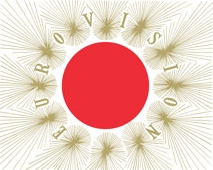
The Eurovision Song Contest 1969 was the 14th edition of the annual Eurovision Song Contest. It took place in Madrid, Spain, following the country's victory at the 1968 contest with the song "La La La" by Massiel. Organised by the European Broadcasting Union (EBU) and host broadcaster Televisión Española (TVE), the contest was held at the Teatro Real on 29 March 1969 and was hosted by Spanish television presenter and actress Laurita Valenzuela.

The Eurovision Song Contest 1968 was the 13th edition of the annual Eurovision Song Contest. It took place in London, United Kingdom, following the country's first victory at the 1967 contest with the song "Puppet on a String" by Sandie Shaw. Despite having won for the first time the year before, it was actually the third time that the United Kingdom had hosted the competition, having previously done so in 1960 and 1963, both of which also took place in London. Organised by the European Broadcasting Union (EBU) and host broadcaster British Broadcasting Corporation (BBC), the contest was held at Royal Albert Hall on 6 April 1968, and was hosted by Katie Boyle for the third time. It was notably also the first time that the contest was broadcast in colour.
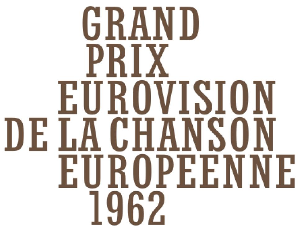
The Eurovision Song Contest 1962 was the 7th edition of the annual Eurovision Song Contest. It took place in Luxembourg City, Luxembourg, following the country's victory at the 1961 contest with the song "Nous les amoureux" by Jean-Claude Pascal. The contest was organised by the European Broadcasting Union (EBU) and host broadcaster Compagnie Luxembourgeoise de Télédiffusion (CLT), and was held at the Villa Louvigny on Sunday 18 March 1962 hosted by the Luxembourgish speaker Mireille Delannoy. This remains the last time that the final of the contest was not held on a Saturday, as since 1963 the final of the contest has consistently been held on a Saturday evening.
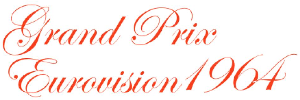
The Eurovision Song Contest 1964 was the 9th edition of the annual Eurovision Song Contest. It took place in Copenhagen, Denmark, following the country's victory at the 1963 contest with the song "Dansevise" by Grethe and Jørgen Ingmann. Organised by the European Broadcasting Union (EBU) and host broadcaster Danmarks Radio (DR), the contest was held at Tivolis Koncertsal on 21 March 1964, and was hosted by Danish TV presenter Lotte Wæver.

The Eurovision Song Contest 1965 was the tenth edition of the annual Eurovision Song Contest. It took place in Naples, Italy, following the country's victory at the 1964 contest with the song "Non ho l'età" by Gigliola Cinquetti. Organised by the European Broadcasting Union (EBU) and host broadcaster Radiotelevisione italiana (RAI), the contest was held at Sala di Concerto della RAI on 20 March 1965, and was hosted by Italian singer Renata Mauro.

The Eurovision Song Contest 1967 was the 12th edition of the annual Eurovision Song Contest. It took place in Vienna, Austria, following the country's victory at the 1966 contest with the song "Merci, Chérie" by Udo Jürgens. Organised by the European Broadcasting Union (EBU) and host broadcaster Österreichischer Rundfunk (ORF), the contest was held at the Großer Festsaal der Wiener Hofburg on 8 April 1967, becoming the first contest held in the month of April, and was hosted by Austrian actress Erica Vaal.

The Eurovision Song Contest 1970 was the 15th edition of the annual Eurovision Song Contest and took place in Amsterdam, Netherlands. Organised by the European Broadcasting Union (EBU) and host broadcaster Nederlandse Omroep Stichting (NOS), the contest was held at the RAI Congrescentrum on 21 March 1970, and was hosted by Dutch television presenter Willy Dobbe.
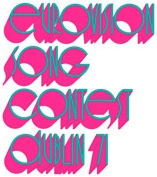
The Eurovision Song Contest 1971 was the 16th edition of the annual Eurovision Song Contest. It took place in Dublin, Ireland, following the country's victory at the 1970 contest with the song "All Kinds of Everything" by Dana. Organised by the European Broadcasting Union (EBU) and host broadcaster Radio Telefís Éireann (RTÉ), the contest was held at the Gaiety Theatre on 3 April 1971, and was hosted by Irish television presenter Bernadette Ní Ghallchóir.
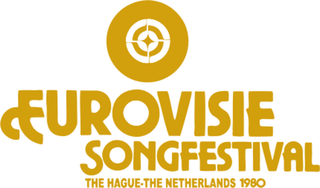
The Eurovision Song Contest 1980 was the 25th edition of the annual Eurovision Song Contest. It took place in The Hague, Netherlands, and was organised by host broadcaster Nederlandse Omroep Stichting (NOS) – which agreed to stage the event after Israel, having won in both 1978 and 1979, declined to host it for a second successive year – and the European Broadcasting Union (EBU). The contest was held at the Nederlands Congresgebouw on 19 April 1980 and was hosted by Dutch actress Marlous Fluitsma, although each song was introduced by a presenter from the participating nation.

The Eurovision Song Contest 1979 was the 24th edition of the annual Eurovision Song Contest. It took place in Jerusalem, Israel, following the country's victory at the 1978 contest with the song "A-Ba-Ni-Bi" by Izhar Cohen and the Alphabeta. Organised by the European Broadcasting Union (EBU) and host broadcaster Israeli Broadcasting Authority (IBA), the contest was held at the International Convention Centre on 31 March 1979 and was hosted by Israeli television presenter Daniel Pe'er and singer Yardena Arazi. This was the first time that the Eurovision Song Contest was held outside Europe.

The Eurovision Song Contest 1982 was the 27th edition of the annual Eurovision Song Contest. It took place in Harrogate, United Kingdom, following the country's victory at the 1981 contest with the song "Making Your Mind Up" by Bucks Fizz. Organised by the European Broadcasting Union (EBU) and host broadcaster British Broadcasting Corporation (BBC), the contest was held at the Harrogate International Centre on 24 April 1982 and was hosted by English TV presenter and newsreader Jan Leeming.

The Eurovision Song Contest 1973 was the 18th edition of the annual Eurovision Song Contest. It took place in Luxembourg City, Luxembourg, following the country's victory at the 1972 contest with the song "Après toi" by Vicky Leandros. Organised by the European Broadcasting Union (EBU) and host broadcaster Compagnie Luxembourgeoise de Télédiffusion (CLT), the contest was held at the Grand Théâtre on 7 April 1973 and was hosted by German television presenter Helga Guitton.

The Eurovision Song Contest 1972 was the 17th edition of the annual Eurovision Song Contest. It took place in Edinburgh, United Kingdom and was organised by the European Broadcasting Union (EBU) and host broadcaster British Broadcasting Corporation (BBC), who agreed to stage the event after Monaco, who won in 1971, were unable to meet the demands of hosting the event and could not find a suitable venue. The contest was held at the Usher Hall on 25 March 1972 and was hosted by Scottish ballet dancer Moira Shearer.

The Eurovision Song Contest 1977 was the 22nd edition of the annual Eurovision Song Contest. It took place in London, United Kingdom, following the country's victory at the 1976 contest with the song "Save Your Kisses for Me" by Brotherhood of Man. Organised by the European Broadcasting Union (EBU) and host broadcaster British Broadcasting Corporation (BBC), the contest was held at the Wembley Conference Centre on 7 May 1977, marking the first time the event took place in the month of May since the first contest in 1956. The contest was directed by Stewart Morris and hosted by English journalist Angela Rippon.
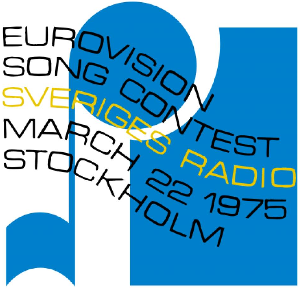
The Eurovision Song Contest 1975 was the 20th edition of the Eurovision Song Contest, held on 22 March 1975 in the Sankt Eriks-Mässan in Stockholm, Sweden. Organised by the European Broadcasting Union (EBU) and host broadcaster Sveriges Radio (SR), and presented by Karin Falck, the contest was held in Sweden following the country's victory at the 1974 contest with the song "Waterloo" by ABBA.

The Eurovision Young Dancers 1987 was the second edition of the Eurovision Young Dancers, held at the Schlosstheater Schwetzingen, Germany on 31 May 1987. Organised by the European Broadcasting Union (EBU) and host broadcaster Zweites Deutsches Fernsehen (ZDF), dancers from fourteen countries participated in the televised final. Austria, Canada, Denmark and Yugoslavia made their debut at the contest, while Belgium and Netherlands competed together with a joint entry.

The Eurovision Young Dancers 1989 was the third edition of the Eurovision Young Dancers held at the Palais des Congrès in Paris, France on 28 June 1989. Organised by the European Broadcasting Union (EBU) and host broadcaster France Régions 3 (FR3), dancers from ten countries participated in the televised final. A total of seventeen countries took part in the competition. Cyprus and Portugal made their debut at the contest.

The Eurovision Young Musicians 1992 was the sixth edition of the Eurovision Young Musicians, held at Cirque Royal in Brussels, Belgium on 9 June 1992. Organised by the European Broadcasting Union (EBU) and host broadcaster Radio Télévision Belge Francophone (RTBF), musicians from eight countries participated in the televised final. Eighteen countries took part in the competition. All participants performed a classical piece of their choice accompanied by the Belgian National Orchestra, conducted by Ronald Zollman. Hungary and Poland made their début, while Greece and Italy decided not to participate.
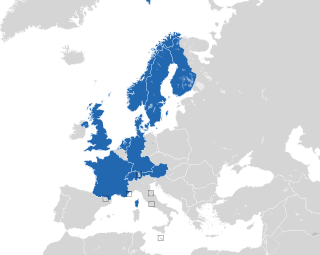
The Eurovision Young Musicians 1984 was the second edition of the Eurovision Young Musicians, held at the Victoria Hall in Geneva, Switzerland on 22 May 1984. Organised by the European Broadcasting Union (EBU) and host broadcaster the Swiss Broadcasting Corporation, musicians who could be no older than 19 years of age, from seven countries participated in the televised final hosted by Georges Kleinmann. They were all accompanied by the Roman Swiss Orchestra, conducted by Horst Stein. Finland and Netherlands made their début, while Norway withdrew from competition.
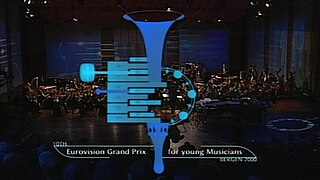
The Eurovision Young Musicians 2000 was the tenth edition of the Eurovision Young Musicians, held at Grieg Hall in Bergen, Norway on 15 June 2000. Organised by the European Broadcasting Union (EBU) and host broadcaster Norsk rikskringkasting (NRK), musicians from eight countries participated in the televised final. As said by the host Arild Erikstad, a total of twenty-four countries took part in the competition. All participants performed a classical piece of their choice accompanied by the Bergen Philharmonic Orchestra, conducted by Simone Young. Seven countries returned to the contest, while Croatia, Cyprus and Sweden withdrew from the 2000 contest.






















